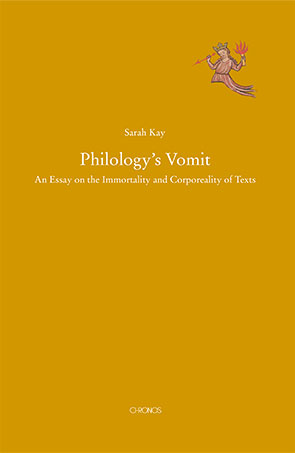Philology's Vomit
An Essay on the Immortality and Corporeality of Texts
Mediävistische Perspektiven, Band 5
Broschur
ISBN 978-3-0340-1427-4
CHF 15.00 / EUR 15.00
Vergriffen
E-Book (pdf)
ISBN 978-3-0340-6427-9
CHF 10.00 / EUR 10.00
- Kurztext
- Autor/in
- Einblick
- Buchreihe
- Downloads
This essay considers philology from the standpoint of its recent reinvention as a theoretical discipline, reflecting in particular on how corporeal insistence and immortal significance compete for priority in the philological study of texts. It takes as its guiding thread the episode in Martianus Capella’s “Marriage of Philology and Mercury” in which Philology, touched by Immortality, vomits up books which are then appropriated by the Muses and the liberal arts for use in their teaching.
This episode’s combination of visceral physicality with the promise of immortality invites comparison with concerns current among philologists today, such as “material” and “queer” philology, the extent to which manuscript culture is legible, and the nature of textual production and reproduction. Reactions to this passage dating from the seventh to the twenty-first centuries show both how these concerns have been addressed historically, and how Martianus’s portrayal of Philology is relevant to the theorization of philology today.
This episode’s combination of visceral physicality with the promise of immortality invites comparison with concerns current among philologists today, such as “material” and “queer” philology, the extent to which manuscript culture is legible, and the nature of textual production and reproduction. Reactions to this passage dating from the seventh to the twenty-first centuries show both how these concerns have been addressed historically, and how Martianus’s portrayal of Philology is relevant to the theorization of philology today.
Inhalt
Preface by Christian Kiening
List of Plates
Acknowledgments
Philology’s Vomit. An Essay on the Immortality and Corporeality of Texts
- Introduction
- Martianus Capella
- The earliest commentary
- The Berlin commentary
- The commentary by Johannes Dubravius
- Spenser’s Error in The Faerie Queene
- Fulgentius touched by Calliope
- Conclusion
Notes
Plates
Appendix
Bibliography
List of Plates
Acknowledgments
Philology’s Vomit. An Essay on the Immortality and Corporeality of Texts
- Introduction
- Martianus Capella
- The earliest commentary
- The Berlin commentary
- The commentary by Johannes Dubravius
- Spenser’s Error in The Faerie Queene
- Fulgentius touched by Calliope
- Conclusion
Notes
Plates
Appendix
Bibliography
Die Schriftenreihe repräsentiert die Breite der mediävistischen Forschung an der Universität Zürich und darüber hinaus.
